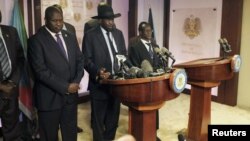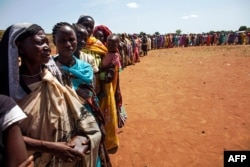Gunfire has erupted again in South Sudan's capital following days of violence between rival factions that left more than 100 people dead.
Witnesses in Juba say shots rang out in parts of the city Sunday as former rebels and government troops exchanged heavy gunfire.
Earlier, the U.S. State Department issued an urgent call for calm in South Sudan after the deadly fighting began on the eve of the fifth anniversary of the country's independence.
The U.S. statement urges fighters loyal to President Salva Kiir and those backing his rival, current First Vice President Riek Machar, to "disengage and cease fighting."
Gunfire first erupted late Thursday, when five soldiers backing the president were killed in a clash with Machar loyalists at a security checkpoint near a medical clinic in the city.
Hours later, as the two officials met at the presidential palace, United Nations observers reported heavy gunfire and shelling near an encampment in the city for internal refugees. Other witnesses reported gunfire across much of the area.
Neither Kiir nor Machar could initially explain the latest fighting, but they urged their followers to remain calm.
Africa's newest nation is recovering from a civil war, fought along ethnic lines, that began in December 2013 after Kiir fired Machar as vice president. A peace deal late last year ended the fighting, and another agreement in April led to the formation of a transitional unity government and to Machar's reinstatement as vice president.
However, Kiir, an ethnic Dinka, and Machar, a Nuer tribesman, have yet to integrate their forces.
Thursday's and Friday's fighting was the first major outbreak of violence since Machar was reappointed vice president.
The World Food Program says 4.8 million South Sudanese are facing severe food shortages this year, with parts of the impoverished country on the brink of famine. It also says fighting has driven 2.4 million residents from their homes, while hundreds of thousands of others have fled the country as refugees.
With the country's fragile economy in shambles, monitors predict as many as 1 million South Sudanese will have fled the country by the end of the year.






